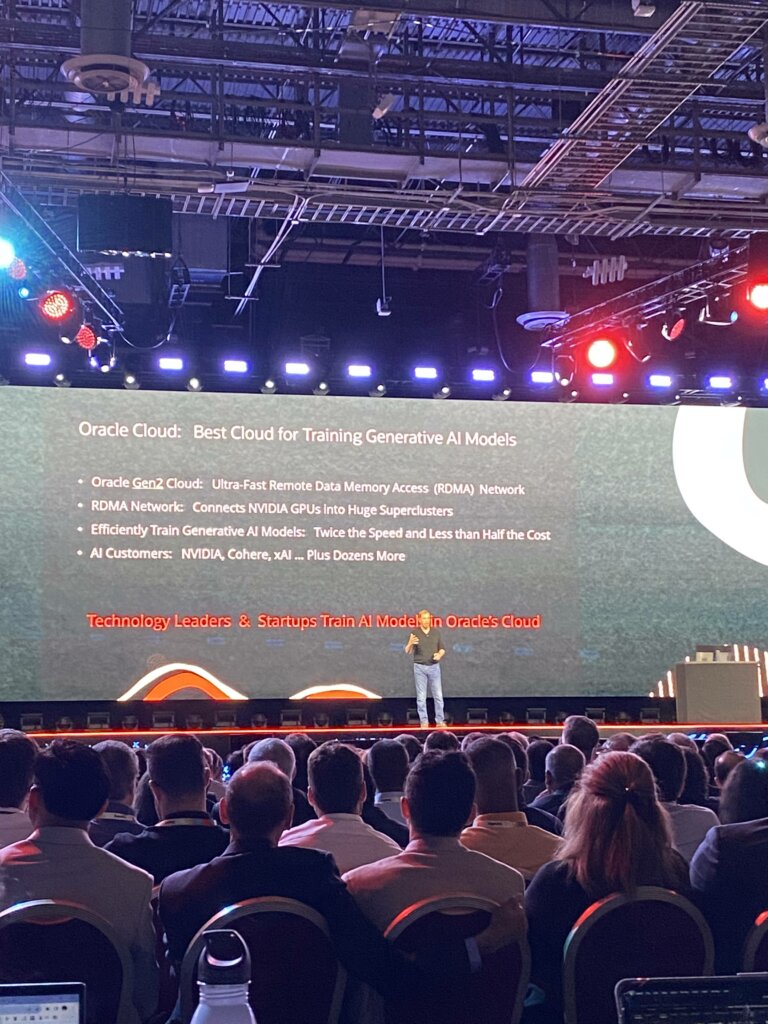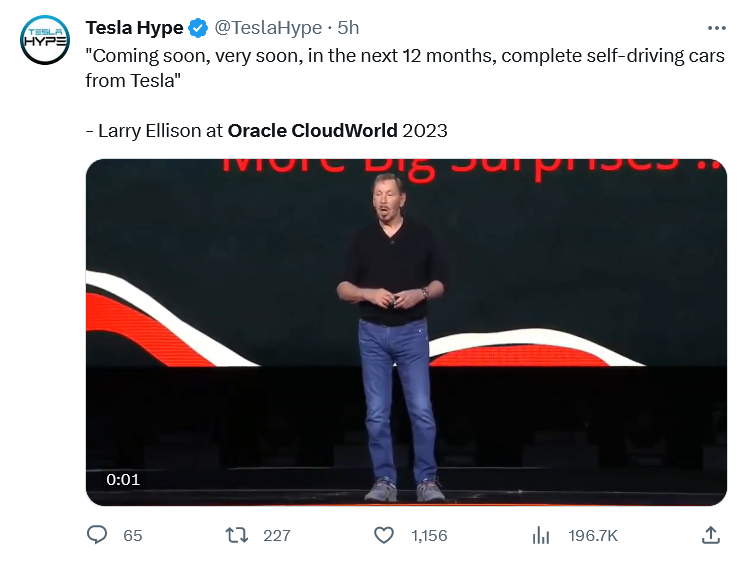
Oracle introduces generative AI capabilities to help organizations improve customer service.
Oracle CloudWorld 2023: Even Elon Musk’s xAI uses Oracle Cloud to do AI training
- Oracle CloudWorld showcased new generative AI features.
- The generative AI elements are aimed at enhancing customer interactions and efficiency.
- Oracle sets itself apart with unique networking for faster, cost-effective AI training.
By this point, you’ve likely utilized a generative AI tool like ChatGPT for various tasks, such as developing an application, crafting a grant proposal, or even completing overdue employee evaluations. Whether you’ve engaged in these activities or simply experimented with posing questions to a large language model, it’s hard not to be struck by the capability of generative AI to produce human-like responses.
What’s next in AI?: Larry Ellison’s keynote highlights at Oracle CloudWorld
So, what’s next on the horizon? Oracle’s CTO Larry Ellison may have some insights. In his recent keynote at Oracle CloudWorld, Ellison spoke about “Oracle’s vision for the future.” According to him, there’s a global competition underway to create the next generation of AI—a superior form of artificial intelligence that promises to shape a brighter future.
“ChatGPT 3.5 is no longer the cutting-edge offering in generative AI, as ChatGPT 4.0 has been released. Over the past 12 months, companies like Cohere and OpenAI have developed new large language models that do more than just generate text. They also create images, compose music, write poetry, and even generate computer code—which hits close to home for many of us. Additionally, we can expect complete self-driving cars from Tesla in the next 12 months,” Ellison added.

Oracle’s CTO Larry Ellison talks through Oracle Cloud being the best cloud for training AI models at Oracle CloudWorld 2023.
However, Oracle has unveiled new generative AI-powered capabilities within its Oracle Fusion Cloud Customer Experience (CX) suite. Leveraging Oracle Cloud Infrastructure (OCI) generative AI service, these features seamlessly integrate into current Oracle Fusion Service workflows. The goal is to fine-tune customer service, boost operational efficiency, and allow organizations to improve their overall customer interactions.
Oracle’s approach to cloud computing sets it apart from competitors in several key ways. As highlighted by Larry Ellison, one notable difference is the unique networking infrastructure Oracle employs to interconnect its cloud-based computers.
Oracle utilizes a remote direct memory access (RDMA) network, which allows one computer within the network to access another computer’s memory without interruption to the latter’s operation. That enables rapid data transfer between computers, significantly outpacing conventional network speeds.
Ellison emphasized, “The fact that our standard network across all our clouds utilizes our DMA network means that when we build a computer for training large language models—typically a computer composed of Nvidia GPUs—interconnecting those GPUs results in a computer that runs much more quickly in our cloud compared to others.”

Completely self-driving Teslas – the news from Oracle Cloudworld 2023.
Ellison suggests that Oracle is much faster and far less expensive than other clouds when it comes to training AI models. That’s why Nvidia, Cohere, and Elon Musk’s xAI are all conducting AI training on the Oracle Cloud. Additionally, dozens of other technology leaders and startups are flocking to the Oracle Cloud because it is faster and more economical for building AI models.
A fusion of AI and data security
Built on Oracle Cloud Infrastructure (OCI), Oracle Cloud CX integrates cutting-edge generative AI features that prioritize data security and user privacy. Custom and prebuilt models are hosted on OCI, providing an environment where customer data remains exclusive to the user and is not shared with third-party language model providers. Moreover, only individual clients can access custom models based on their data.
Role-based security is woven directly into Oracle Fusion Service workflows, effectively safeguarding sensitive customer data and limiting content recommendations to authorized service agents.
Adding to its pre-existing suite of AI tools, Oracle Fusion Service incorporates new generative AI capabilities aimed at automating content generation and streamlining processes. These enhancements not only complement the existing AI features but also aim to increase productivity for customer service agents and stakeholders. Here’s what it can do:
- Assisted agent responses: boosts service agent productivity by auto-generating draft replies to customer queries. Particularly useful for high-volume industries like ecommerce and financial services.
- Assisted knowledge articles: streamlines the creation of new knowledge base content by auto-generating articles on emerging issues, letting agents help customers quickly. Ideal for complex sectors like high technology and medical devices.
- Search augmentation: enhances both agent and customer experience by integrating short-form, AI-generated answers in search and chat functionalities. Useful for quickly locating solutions within knowledge bases or other indexed documents.
- Customer engagement summaries: improves productivity by auto-summarizing the critical information in service requests, including customer history and planned actions. This helps with quick decision-making, significantly when issues are escalated.
- Assisted guidance authoring: helps experts easily create a consistent set of triage and troubleshooting questions, ensuring a standardized process for service agents to follow.
- Field service recommendations: increases field technician efficiency by suggesting contextually relevant troubleshooting content, minimizing the need for multiple on-site visits.
Beyond customer service: growing revenue with AI-enhanced Oracle Cloud CX
In a world where customers demand real-time, unified experiences, the real challenge for professionals in marketing, sales, and customer service lies in harnessing the sheer volume and speed of data. With the aid of AI, these professionals are tasked with deciphering this data to glean actionable insights that can enhance customer experiences and foster business growth.
Rob Tarkoff, the executive vice president and general manager of Oracle Cloud CX, said that pre-trained large language models are revolutionizing interactions with people, content, and vital information within organizations. “With a unique combination of traditional and generative AI, running on Oracle Cloud infrastructure and embedded in application flows, Oracle Cloud CX enables customer experience professionals to do their jobs with more accuracy and efficiency to ultimately drive more revenue,” Tarkoff further explained.
New Oracle Cloud CX capabilities include:
- Generative AI for service: speeds up customer service by auto-generating content and streamlining processes. Features include assisted agent responses, knowledge articles, and more.
- Guided campaigns: streamlines marketing and sales by automating personalized, brand-approved campaigns that deliver qualified leads directly to sellers.
- AI-powered account linking: helps sellers by providing complete account visibility, which aids in quicker deal closures and identifies upsell opportunities.
- B2B customer data platform enhancements: offers targeted marketing by scoring sales opportunities based on past engagement and supports complex account hierarchies.
- Intelligent sales orchestration: boosts seller efficiency with automated processes and AI-generated insights, guiding them through complex sales scenarios.
- Advanced field asset monitoring: Enhances field service productivity by giving technicians mobile access to comprehensive asset information, from work orders to warranties.
The recent AI enhancements to Oracle Cloud CX offer practical solutions for streamlining traditionally time-consuming tasks. These updates are expected to improve employee workflows and customer satisfaction, potentially leading to better financial performance.
READ MORE
- 3 Steps to Successfully Automate Copilot for Microsoft 365 Implementation
- Trustworthy AI – the Promise of Enterprise-Friendly Generative Machine Learning with Dell and NVIDIA
- Strategies for Democratizing GenAI
- The criticality of endpoint management in cybersecurity and operations
- Ethical AI: The renewed importance of safeguarding data and customer privacy in Generative AI applications




